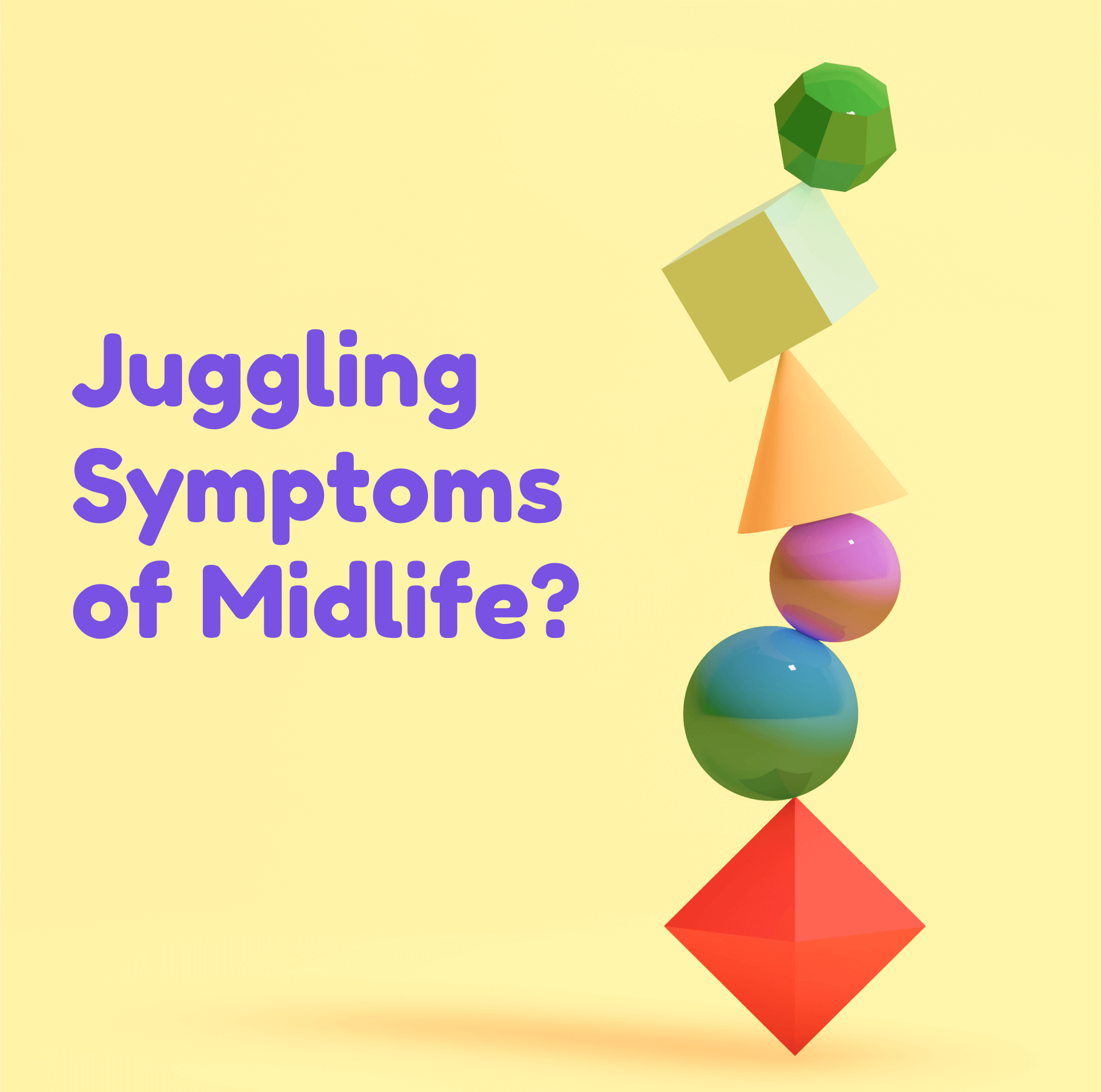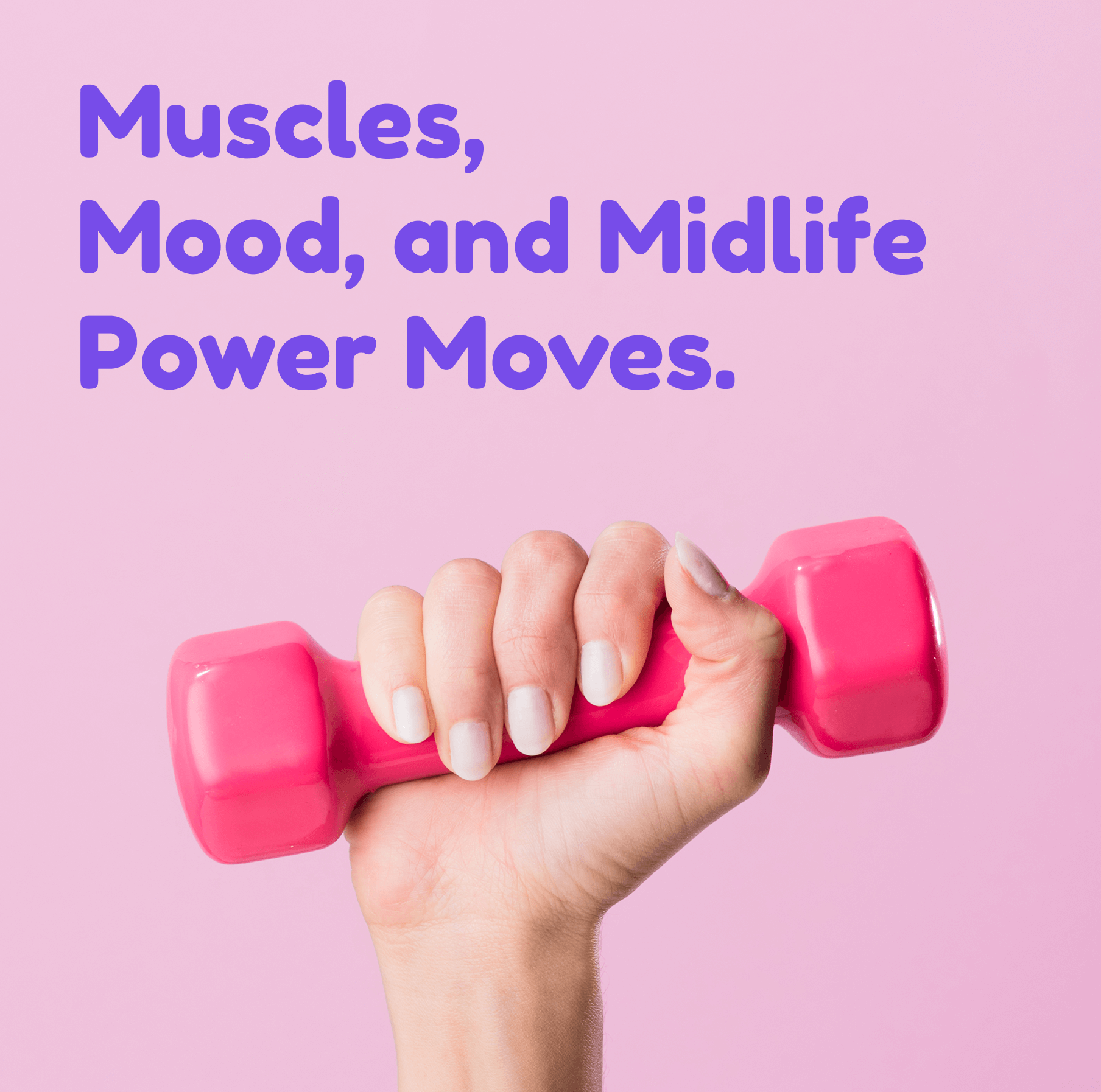
Menopause isn’t just a medical milestone—it’s a personal revolution.
If you’ve been riding the unpredictable roller coaster of perimenopause, you know the ups and downs can feel overwhelming. But here’s a thought: what if you could say “goodbye” to the confusing symptoms of perimenopause and confidently welcome menopause as a new chapter? In this article, we explore the transition with compassion, humor, and practical advice designed to empower you through these transformative months or even years.
Got questions? Ask Noor.
Understanding the Transition
Perimenopause is that transitional phase where your body starts to whisper (or sometimes shout) that change is coming. It is characterized by perimenopause symptoms such as irregular periods, hot flashes, vaginal dryness, changes in weight and fat distribution, worsening PMS, and / or even a bit of brain fog. During this time, hormonal levels fluctuate wildly—one day you might feel like your best self and the next, you’re grappling with mood swings and exhaustion.
Menopause, on the other hand, marks the official end of your reproductive years. It’s defined by the absence of menstrual cycles for 12 consecutive months and the onset of a life‑long drop in levels of estrogen and progesterone (if untreated). While this might sound daunting, many women find that once they cross this threshold, they shed the unpredictability of perimenopause. That said, they also often then suffer from persistent untoward symptoms. As you make this transition, it can be helpful to think of menopause as a natural evolution in your life—a time to refocus on yourself, embrace new possibilities, and keep hope alive knowing that there are effective solutions to the challenges presented.
Recognizing the Signs
The signs of perimenopause can sometimes sneak up on you. You might notice:
- Hot Flashes: Sudden waves of heat that leave you drenched, sometimes at the most inopportune moments.
- Irregular Periods and worsening Pre‑Menstrual Syndrome (PMS): Your cycle may become unpredictable, with periods that are lighter, heavier, or completely erratic and PMS symptoms amplified.
- Brain Fog: Moments when your mind feels cloudy, making it hard to concentrate or recall details.
- Mood Swings: Emotional ups and downs that can be confusing and stressful.
- Insomnia: Whether a byproduct of night sweats and hot flashes or an unrelated perimenopausal symptom, insomnia is common in perimenopause. Fortunately, effective hormonal and other treatments can help.
- Vaginal Dryness: As a sign of lower estrogen levels, the vaginal wall can atrophy and become more dry, leading to discomfort with intimacy. Local treatment in various forms can be very helpful and systemic treatment similarly beneficial upon onset of menopause.
- Loss of Libido: Libido and ability to orgasm are more directly tied to the ‘hormone of desire,’ testosterone. Testosterone levels also decline around the perimenopausal and menopausal transitions, negatively impacting sexual health in the process along, oftentimes with mood, energy levels, motivation, sense of well‑being, and more. As with vaginal dryness, hormonal supplementation for symptomatic women can provide welcome relief.
- Weight Gain and Changes in Body Composition: Perimenopausal hormonal changes involving estrogen and progesterone but also testosterone can impact not only the body’s proclivity to accumulate fat but also where that fat is distributed. Related, women can become more ‘sensitive’ to the impact of dietary carbohydrate on fat accumulation as their bodies become more ‘insulin resistant.’ Levels of muscle mass can also decline both through lifestyle and hormonal influences such as age‑related reductions in levels of testosterone and other ‘anabolic’ hormones.
- Changes in Hormonal Levels: As estrogen and progesterone levels fluctuate and other hormones decline at mid‑life, you may experience a variety of physical and emotional symptoms.
These perimenopause symptoms can last for months or years, varying widely from one woman to another. For some, it’s a time of subtle change; for others, it’s a period marked by dramatic shifts. Understanding your body and recognizing these signs is the first step toward managing the transition effectively.
Managing the Change
While the body’s natural evolution can sometimes feel like a mystery, there are practical strategies to help manage symptoms and ease the transition:
Lifestyle Adjustments
Balanced Diet: A nutrient‑dense diet can help stabilize hormonal levels. Consider including plenty of fruits, vegetables, lean proteins, and whole grains. Foods rich in phytoestrogens, such as soy, might also help moderate fluctuations.
Regular Exercise: Engage in weight‑bearing exercises to protect your bones and improve your overall energy levels. Exercise can also help reduce the frequency and intensity of hot flashes.
Stress Management: Whether it’s yoga, meditation, or simply a quiet walk, finding a way to manage stress is key. Stress can worsen symptoms like brain fog and mood swings, so regular relaxation practices can be beneficial.
Medical Options
For some women, lifestyle adjustments might not be enough. This is where a conversation with your healthcare provider becomes invaluable. There are several treatments available:
Hormone Therapy: Also known as hormone replacement therapy (HRT), this treatment can help stabilize hormonal levels, easing common menopause symptoms like hot flashes and irregular periods. When considering hormone therapy, it’s important to discuss your options, including the benefits and risks.
Birth Control Pills: For women who still need contraception, low‑dose birth control pills may help regulate menstrual cycles while easing perimenopause symptoms.
Non‑Hormonal Medications: In cases where hormone therapy isn’t a good fit, certain antidepressants or other non‑hormonal treatments can help manage hot flashes and mood swings.
Each option comes with its own set of considerations, so personalized medical advice is crucial. Remember, there’s no one‑size‑fits‑all solution when it comes to navigating the menopause transition.
A Touch of Humor and Real‑Life Wisdom
It’s easy to feel isolated when you’re experiencing symptoms like hot flashes in the middle of a board meeting or battling brain fog during a family dinner. Yet, many women find solace in knowing they’re not alone. Pop culture and influential voices—think of style icons like Stacy London—remind us that this phase can be met with humor and grace.
Embracing the change with a lighthearted attitude doesn’t diminish the challenges; rather, it empowers you to see the silver lining in every moment. Imagine swapping frantic searches for the perfect remedy for an evening spent laughing over shared experiences. Many women are discovering that menopause is not just about letting go of the old, but also about welcoming new adventures with optimism and self‑care.
Practical Tips for a Smooth Transition
Here are some actionable tips to help you navigate this journey:
Keep a Symptom Journal: Record your experiences with perimenopause symptoms. This can help identify patterns and triggers, making it easier to manage or adjust your lifestyle accordingly.
Dress in Layers: Hot flashes can come and go unexpectedly. Dressing in layers allows you to adjust your comfort level on the fly.
Stay Hydrated: Drinking plenty of water can alleviate some symptoms, such as dry skin and fatigue.
Connect with Others: Sharing your experiences with friends, support groups, or online communities can provide both comfort and practical advice. Sometimes, a good laugh and a shared “aha” moment can make all the difference.
Plan for the Unexpected: Life during this transition might feel a bit like preparing for a surprise party—except the surprises come in the form of irregular periods or sudden mood shifts. Planning and self‑compassion go hand in hand here.
Embracing the Benefits
While the symptoms of perimenopause can be challenging, many women find that menopause brings unexpected benefits. For some, the end of monthly cycles means a newfound sense of freedom and clarity. With the constant hormonal fluctuations behind you, there can be a renewed focus on self‑care, career, hobbies, and relationships.
Menopause often sparks a time of reinvention—a moment to explore interests that might have taken a backseat during your reproductive years. Whether it’s picking up a new hobby, advancing in your career, or simply taking more time to relax, this stage of life can be incredibly liberating. Moreover, the insights gained during the perimenopause journey often lead to a deeper understanding of one’s body and emotions. With this self‑awareness comes the power to advocate for your own health, ask the right questions, and seek out treatments that truly work for you.
Balancing Science and Heart
The conversation around menopause is evolving, blending scientific insights with real‑life experiences. Research into hormonal levels and hormone therapy continues to grow, offering new perspectives on how best to support women through this transition. Yet, while science provides a roadmap, it’s the personal stories—the shared laughs, the tears, and the triumphs—that truly shape our experience of menopause. For example, studies on hot flashes and irregular periods offer crucial information on what to expect, while personal anecdotes remind us that every woman’s journey is unique. The blend of scientific facts and heartfelt wisdom makes this a subject that is both complex and profoundly human.
Looking Forward with Optimism
As you stand at the crossroads of perimenopause and menopause, it’s natural to feel a mix of anticipation and apprehension. The journey might feel like a winding road with unexpected detours, but each twist and turn is an opportunity to learn more about yourself and grow stronger. Remember that while this phase might be accompanied by challenges like hormonal imbalances and unpredictable symptoms, it also marks the beginning of a new era. Embrace the transition as a chance to reinvent yourself. Celebrate your resilience, honor your experiences, and step into menopause with confidence and a sense of humor.
In closing, saying “goodbye” to perimenopause and “hello” to menopause is not about losing a part of yourself—it’s about evolving and reclaiming your narrative. It’s a time to reflect on all that you’ve overcome and to look forward to the adventures ahead. With the right mix of practical strategies, supportive healthcare, and a positive mindset, you can navigate this transition gracefully and emerge stronger than ever. So, here’s to you: to your strength, your wisdom, and the exciting journey that lies ahead. Embrace the change, celebrate your journey, and welcome the new chapter with open arms. After all, this isn’t just a farewell to perimenopause—it’s a warm, confident hello to menopause and all the incredible possibilities it brings.



